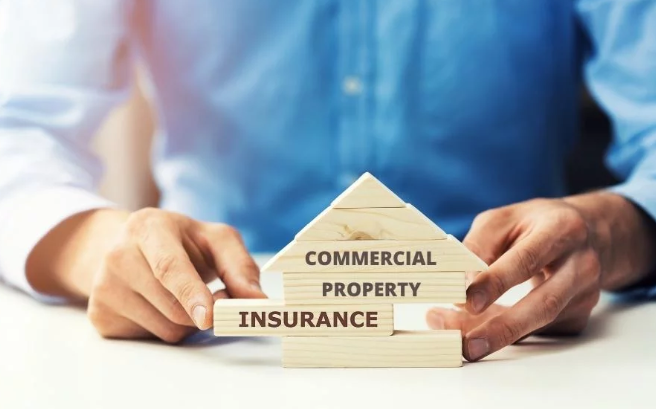Commercial Property Insurance – When running a business, safeguarding your physical assets is crucial. This is where commercial property insurance comes into play. This guide explores what commercial property insurance is, its benefits, leading products, and how you can secure the right coverage for your business.
What is Commercial Property Insurance?

Commercial property insurance provides financial protection for businesses against damage to their physical assets, including buildings, equipment, inventory, and furniture. Whether it’s due to fire, theft, vandalism, or natural disasters, having this coverage ensures that your business can recover quickly from unforeseen events.
Why You Need Commercial Property Insurance
As a business owner, protecting your physical assets should be a top priority. Commercial property insurance is not just an option—it’s a necessity for several compelling reasons:
1. Financial Protection for Your Assets
Every business has a significant investment in its physical assets, including buildings, equipment, inventory, and furnishings. Commercial property insurance provides crucial financial protection against unexpected events such as:
- Natural Disasters: Fires, floods, earthquakes, and storms can cause extensive damage, leading to hefty repair costs. With commercial property insurance, you can recover these costs quickly, ensuring your business remains operational.
- Theft and Vandalism: Unfortunately, theft and vandalism can happen at any time. Having insurance coverage can alleviate the financial burden caused by loss or damage due to criminal activity.
2. Business Continuity
When an unforeseen event disrupts your operations, having commercial property insurance can be a lifesaver. It enables your business to recover more swiftly and efficiently, ensuring you can maintain operations and serve your customers. This continuity is vital for:
- Reputation Management: Businesses that can recover quickly from disruptions tend to maintain their reputation better than those that struggle. Customers appreciate reliability and stability.
- Employee Retention: A well-protected business can support its employees during difficult times, helping them feel secure in their jobs.
3. Peace of Mind
Knowing that your business is protected can provide invaluable peace of mind. When you invest in commercial property insurance, you can focus on growing your business instead of worrying about potential disasters. This sense of security allows you to:
- Innovate and Expand: With insurance coverage in place, you can take calculated risks and pursue new opportunities, knowing you have a safety net.
- Focus on Core Operations: With financial protection, you can devote your time and resources to improving products, services, and customer relationships without being sidetracked by worries about unforeseen events.
4. Regulatory Compliance
In some industries, having commercial property insurance is a regulatory requirement. This is especially true for businesses that lease commercial spaces, where landlords may mandate insurance coverage. Failing to comply with these requirements can result in legal complications or loss of your lease.
5. Additional Coverage Options
Many commercial property insurance policies offer additional coverage options that can be tailored to your business needs. For instance:
- Business Interruption Insurance: This provides coverage for lost income during downtime, ensuring your cash flow remains stable.
- Equipment Breakdown Coverage: This protects against the costs associated with equipment failure, allowing you to maintain productivity.
Benefits of Using Commercial Property Insurance Technology
- Customized Coverage: Technology allows businesses to tailor their policies to fit specific needs.
- Real-Time Monitoring: Advanced tech solutions enable businesses to monitor risks in real time, ensuring proactive measures.
- Quick Claims Processing: Modern technology speeds up claims processing, helping you recover faster after a loss.
Top Products for Commercial Property Insurance

1. The Hartford Commercial Property Insurance
- Description: Offers flexible policies with coverage options tailored to various industries.
- Use Case: Ideal for small to mid-sized businesses needing comprehensive protection.
2. State Farm Commercial Property Insurance
- Description: Provides customizable coverage options and competitive pricing.
- Use Case: Suitable for businesses that require extensive coverage and support.
3. Nationwide Commercial Property Insurance
- Description: Features flexible policy options with excellent customer service.
- Use Case: Great for businesses looking for tailored coverage that fits their unique needs.
4. Progressive Commercial Property Insurance
- Description: Offers various policy options at competitive prices.
- Use Case: Best for businesses that want to compare multiple coverage options easily.
5. Chubb Commercial Property Insurance
- Description: Provides premium coverage options with additional risk management services.
- Use Case: Perfect for businesses seeking extensive coverage and professional guidance.
Comparison Table of Commercial Property Insurance Products
| Product Name | Use Case | Pros | Cons | Price | Features |
|---|---|---|---|---|---|
| The Hartford | Small to mid-sized businesses | Flexible policies, customizable | Higher premiums for extensive coverage | Varies | Industry-specific coverage options |
| State Farm | Extensive coverage needs | Customizable, good customer service | May require a detailed assessment | Varies | Multiple coverage options |
| Nationwide | Tailored coverage | Excellent service, flexible | Some coverage gaps | Varies | Risk management services |
| Progressive | Comparison shoppers | Competitive pricing | Limited customization | Varies | Easy comparison tool |
| Chubb | Extensive needs | Premium coverage | Premium pricing | Varies | Comprehensive risk management |
How to Buy Commercial Property Insurance

Purchasing commercial property insurance is a critical step in protecting your business assets. Here’s a step-by-step guide to help you navigate the process effectively:
1. Assess Your Business Needs
Before shopping for insurance, take the time to evaluate your business’s specific needs. Consider the following factors:
- Value of Assets: Calculate the total value of your business’s physical assets, including buildings, equipment, inventory, and furnishings. This will help you determine how much coverage you need.
- Risks Specific to Your Location: Assess the risks associated with your location, such as susceptibility to natural disasters (floods, earthquakes, etc.) or crime rates. This information can influence the type of coverage you might require.
2. Research Different Insurance Providers
With your needs in mind, start researching various insurance providers. Look for companies that specialize in commercial property insurance and have a good reputation. Consider the following:
- Customer Reviews: Check online reviews and ratings from current and past customers to gauge their experiences with the provider.
- Financial Stability: Look for providers with strong financial ratings to ensure they can meet their claims obligations.
- Industry Expertise: Consider providers who have experience insuring businesses in your specific industry, as they may offer tailored coverage options.
3. Compare Policies and Coverage Options
Once you’ve identified a few reputable providers, it’s time to compare their policies. Here are some aspects to consider:
- Coverage Limits: Review the maximum amount the policy will pay for different types of claims.
- Exclusions: Understand what is not covered by the policy. Common exclusions may include certain natural disasters or specific types of damage.
- Deductibles: Consider the amount you’ll need to pay out-of-pocket before insurance kicks in. A higher deductible can lower your premium, but it may not be ideal if you face a significant loss.
4. Get Quotes
Reach out to your shortlisted insurance providers to obtain quotes. You can typically do this online or by contacting an agent directly. When requesting quotes:
- Provide Accurate Information: Ensure that you provide detailed and accurate information about your business to get the most accurate quotes.
- Ask for Discounts: Inquire about any available discounts, such as bundling multiple policies (e.g., liability insurance) or having safety features in place (like fire alarms or security systems).
5. Consult with Insurance Agents
Consider consulting with an insurances agent or broker who specializes in commercial property insurances. They can help you:
- Understand Your Options: An agent can explain the nuances of different policies and coverage options.
- Tailor Coverage: They can assist in tailoring a policy that fits your unique business needs.
6. Review and Finalize Your Policy
After comparing quotes and understanding your options, choose the policy that best meets your needs. Before signing:
- Read the Policy Thoroughly: Carefully review the terms, coverage limits, exclusions, and other details to ensure you understand what is covered.
- Ask Questions: If you have any doubts or concerns, don’t hesitate to ask the insurance provider or agent for clarification.
7. Purchase the Policy
Once you’re satisfied with the terms, finalize the purchase. You can typically do this online or over the phone. Be sure to:
- Keep Documentation: Store your policy documents in a safe place and make copies accessible to key personnel in your business.
- Set Up Payment Plans: Discuss payment options with your provider, as many offer various plans, including annual or monthly payments.
8. Review Annually
Insurance needs can change as your business grows or evolves. It’s a good practice to review your commercial property insurances policy annually to ensure it still meets your needs. Adjust coverage as necessary, especially if you acquire new assets or expand your operations.
Where to Buy Commercial Property Insurance
You can purchase commercial property insurance from various sources:
- Online Insurance Providers: Websites like The Hartford or Progressive allow you to get quotes and buy policies online.
- Insurance Agents: Consult local agents who can provide personalized service and advice.
- Insurance Brokers: Work with brokers who can compare multiple policies on your behalf.
Price Considerations
Prices for commercial property insurance vary widely based on factors such as:
- Location: Risk levels associated with your area can affect premiums.
- Business Type: Different industries may have unique coverage needs.
- Coverage Amount: Higher coverage limits will result in higher premiums.
Use Cases: Problems Commercial Property Insurance Can Solve
- Natural Disasters: Fires, floods, or storms can devastate business operations. Commercial property insurances covers repair costs, ensuring continuity.
- Theft and Vandalism: Protects against financial loss from theft or vandalism, helping businesses recover without severe financial strain.
- Equipment Damage: Covers repair or replacement costs for damaged equipment, allowing businesses to resume operations quickly.
Frequently Asked Questions (FAQs)
- 1. What does commercial property insurance cover?
Commercial property insurance typically covers physical damage to your business property due to risks like fire, theft, vandalism, and natural disasters.
- 2. How much does commercial property insurance cost?
The cost varies based on factors such as business type, location, coverage amount, and claims history. It’s best to get quotes from multiple providers.
- 3. Do I need commercials property insurance if I rent my space?
Yes, as a renter, you should still consider coverage for your equipment and inventory, as the landlord’s insurance typically covers only the building structure.
- 4. Can I customize my commercials property insurance policy?
Absolutely! Most providers offer customizable policies, allowing you to tailor coverage to fit your specific needs.
- 5. How do I file a claim with my commercial property insurances?
To file a claim, contact your insurance provider directly, provide necessary documentation (like photos of the damage), and follow their claim process.
This comprehensive guide to ensures that you understand its importance and how to secure the right coverage for your business. With the right policy, you can focus on growing your business, knowing your assets are protected!
Conclusion
Buying commercial property insurances involves careful consideration and research. By following these steps—assessing your needs, researching providers, comparing policies, and consulting with experts—you can secure the right coverage to protect your business assets effectively. Remember, investing in the right insurance policy is an investment in your business’s future security!